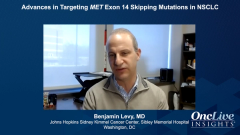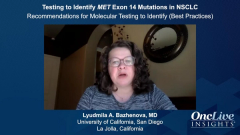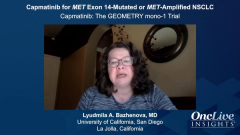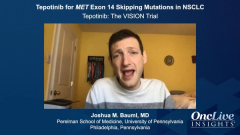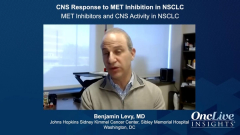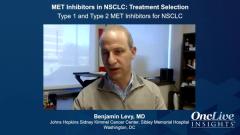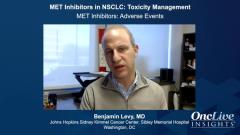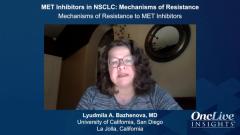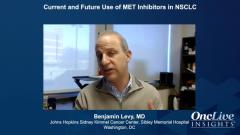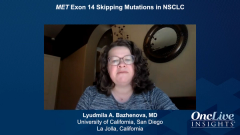
Testing to Identify MET Exon 14 Mutations in NSCLC
Recommendations for using next-generations sequencing panels as well as liquid biopsies to help identify MET exon 14 skipping mutations and other oncogenic drivers in patients with non–small cell lung cancer.
Episodes in this series

Benjamin Levy, MD: I think today with the understanding of the genomic underpinnings of a tumor for lung cancer, it is incumbent upon all physicians, researchers, clinicians to do molecular testing. Molecular testing has come a long way. Similar to the therapeutic advances we’ve had, these have been predicated on a better understanding of the genomic underpinnings. The best way to interrogate genomic underpinnings is through next-generation sequencing [NGS]. Next-generation sequencing does include identifying MET exon 14 skipping mutations. Some of the older methods of next-generation sequencing don’t necessarily capture these mutations. They occur in the large intronic region of the DNA, and they’re sometimes hard to pick up or detect on older platforms. But contemporary DNA platforms and RNA platforms, particularly, for next-generation sequencing optimally detect MET exon 14 skipping mutations.
I can’t make a comment about molecular testing without adding in the role of liquid biopsies. We now have FDA-approved platforms that we can use for patients. So not only can we do next-generation sequencing, preferably RNA-based next-generation sequencing platforms on the tissue, but we also have the ability to do a DNA platform on the liquid plasma. This is important because we know that these mutations are sometimes missed in tissue but can be picked up in plasma. I have had several patients for whom we have identified MET exon 14 skipping mutations in the plasma. So this is a call to leave no gene behind. That includes making sure we’re identifying MET exon 14 mutations, given the drugs that we now have. In my practice, I use both DNA- and RNA-based approaches every day. I use both a tissue-based and liquid-based platform to best interrogate the tumor in terms of understanding the genomic underpinnings.
Lyudmila A. Bazhenova, MD: Each practice is different regarding how they approach molecular testing for patients with lung cancer. I do next-generation sequencing for patients with nonsquamous non–small cell lung cancer at the time of diagnosis, and I utilize both liquid as well as tissue NGS. The reason for using both assays is because liquid results come back sooner. I tend to treat off the liquid results if I find an oncogenic driver. Generally, with fairly rare exceptions, I wait for next-generation sequencing results to initiate first-line therapy.
In addition to MET exon 14 skipping mutations, I’m also looking for 6 other FDA-approved oncogenic drivers: EGFR, ALK, ROS, NTRK, BRAF, and RET. I also pay attention to other abnormalities for which we do not yet have FDA-approved drugs but do have clinical trials. Examples include patients with KRAS G12C mutations, patients with HER2 exon 20 insertions, and patients with EGFR exon 20 insertions.
Joshua M. Bauml, MD: When you have a patient with a molecular driver alteration, it is critical to utilize targeted therapy first, in my opinion. We know the response rates to targeted therapies are generally higher than what we see with chemotherapy and immunotherapy for 2 reasons. First, targeted therapies have higher response rates when given alone. But the other issue is that because many of these patients are never-smokers or are light smokers, their likelihood of benefit from immunotherapy is somewhat diminished. We saw that for MET in a series done out of Memorial Sloan Kettering Cancer Center, where the response rate for MET-modified non–small cell lung cancer was much lower than we’d see in the general patient population. There was a separate series that was done in France showing some response to PD-1 blockade in MET-modified lung cancer, but the rate of smoking in France is, of course, much higher than it is in the United States. So I think it’s critical to utilize a targeted therapy first.
Transcript Edited for Clarity


